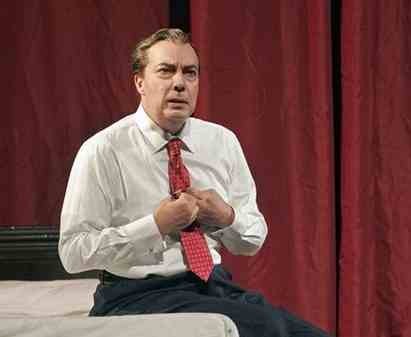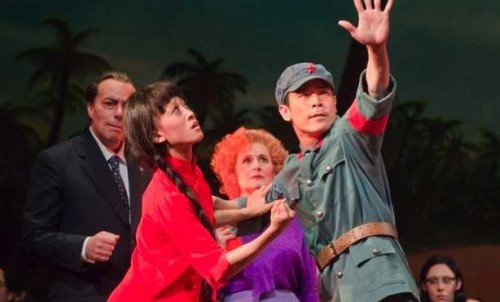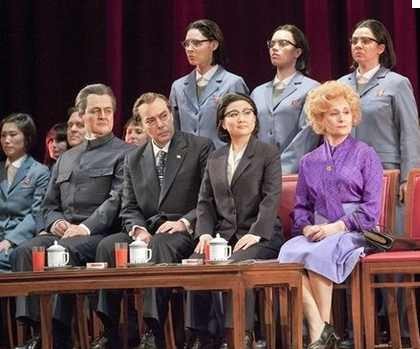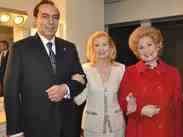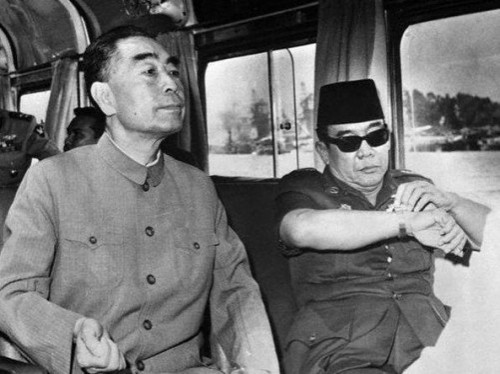Nixon in China at the Metropolitan Opera
Live in HD February 12
By: Susan Hall - Feb 07, 2011
Nixon in China
By John Adams
Libretto by Alice Goodman
Metropolitan Opera, New York
Conducted by John Adams
Directed by Peter Sellars
Production: Peter Sellars
Set Designer: Adrianne Lobel
Costume Designer: Dunya Ramicova
Lighting Designer: James F. Ingalls
Choreographer: Mark Morris
Sound Designer: Mark Gre
Chian Ch'ing: Kathleen Kim
Pat Nixon: Janis Kelly
Mao Tse-tung: Robert Brubaker
Chou En-lai: Russell Braun
Richard Nixon: James Maddalena
Henry Kissinger: Richard Paul Fink
February 5, 2011
Nixon in China made its debut at the Metropolitan Opera in New York last week. It will be broadcast locally as an HD in theaters on February 12. This is an important American opera, based not on a novel, but rather on a real event, the arrival of Richard Nixon in China in 1972. As we know, this visit opened up one-fifth of the world to us.
The HD is sure to be a special. The Met’s HD directors, most often Gary Halverson and Brian Large, are superb at translating the Met’s staged events to the screen and in Nixon they are given big, brassy orchestration, lyric arias, and wonderful sung speech. The music delivers the words.
As Airforce One arrives the audience spontaneously applauds. How the audience, which is often used as cast, will be handled on screen will be interesting and undoubtedly fun to watch.
Fun is the applicable adjective for the opera. If you hear about repetitions a la Philip Glass, don’t expect a Buddhist communion. Adams repetitions are rich in harmonic diversity and from them lovely lyric lines often spring. We are poked by references to Gounod, Strauss and Wagner. Adams has said, like Verdi before him, that music is meant to enter the ear easily. His does.
This is not CNN opera, or, as Adams remarks with distaste, “a docu-opera.” What is the same as the event? The plane and Mao’s Red Book.
The dramatization of the formal events is entertaining. Only reflections by the principals in Act III are weak. However, the final aria sung by Chou en Lai, wondering what has happened, rivets. The superior singing throughout will surely engage.
On Saturday evening, James Maddalena, who created the role of Nixon in the original production, sang with a full, vibrant baritone. In his first aria, called the “News Aria,” he intones the staccato words with the orchestral accompaniment in clipped, large tones. Adams likes his singing in part because Maddalena has an exact rhythmic response.
Maddalena, during a panel discussion early in the week, said he has come to love Nixon, a complex, highly emotional character. His feeling for the man colors the role and grabs even long-time Tricky Dick objectors.
Janis Kelly makes her Met debut as Pat Nixon and is brilliant, inhabiting the role of a 50s housewife and political partner. Her aria, “This is prophetic,” was beautifully sung and moving. Kelly created the role of Diva in Rufus Wainwright’s new opera and a documentary on the preparations for the production reveals her meticulous attention to creating difficult roles. Her work seems effortless in Nixon and engages fully.
Tricia Nixon Cox was in the opening night audience and recognized her parents. When she went back stage after the first act, she asked Kelly and Maddalena to hook arms with her, because that is what her family always did.
For the composer, the librettist, and the director, Peter Sellars, whose idea it was to stage Nixon’s trip to China, bending over backwards to be fair to all parties must have ended when they created Kissinger. He has a virtually non-singing role and during Act II plays the role of a sexually abusive Chinese landowner who dances on the back of a Chinese peasant. Richard Paul Fink takes on the role with gusto.
Kathleen Kim shines as Ms. Mao. Her take on a Queen-of –the-Night like aria, “I am the Wife of Mao Zedong” reflecting the optimism in China and also the brutality. Kim, who is sometimes over the top as Zerbinetta and Oscar, has an opportunity to push the voice and capture the texture of her role.
Robert Brubaker, a heldentenor, sang Mao. His top was ringing, but it seemed right. Adams has thought a lot about the sound he wants to accompany the orchestra. Loud he wanted from Brubaker and Kathleen Kim.
Russell Braun makes Chou en Lai the soul of the opera. Chou en Lai is the only character who doesn’t come across as parody, and the one presented with the fiercest intellect. In the banquet scene, which takes place on February 22, he is the only one who gets Pat Nixon’s reference to Washington’s birthday.
Great attention is paid to detail through the opera. From Braun’s draping of a perhaps withered right arm or hand, which is reflected in photographs of Chou, to the three secretaries to Mao, who move their hands to the music as they translate. At one point, they made shadow rabbits, 2011 being the Chinese year of the rabbit.
In a panel discussion earlier in the week, it was revealed that Mao, who is very sexually active in Act III, imagined that he could defy death by having lots of sex. John Adams said he wished he had known this Rx earlier.
Much has been made of miking the singers. Adams has said that he likes the singing voice to be “natural and not forced…some singers like Thomas Hampson and Bryn Terfel have huge voices, but most singers do not. They have to “go into overdrive to fill a three thousand seat hall. And I don’t like overdrive. I don’t like it in Wagner. I don’t like it in Verdi, and I certainly don’t like it in my own music..still I view amplification as in its infancy. We are the Wright Brorthers to aeronautics.”
This political piece doesn’t date, because it’s pathos is particularly American. It was written both for Republicans and the Chinese. It is also a piece of political scene craft. Politicians are made for the operatic stage. So much of politics is photo op. Singers sing for the camera. All this should be captivating on the big screen on Saturday, the 12th of February.
Repeated at the Metropolitan Opera on February 9, 12, 15,19
www.Metoperafamily.org
212-362-6000

